
Interpreting the Body
Between Meaning and Matter
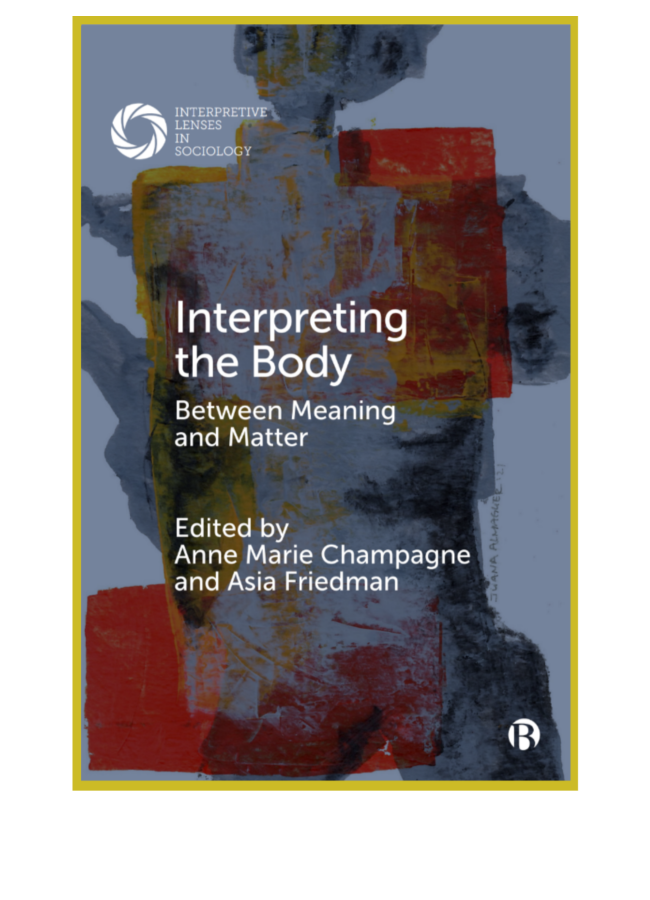
Interpreting the Body: Between Meaning and Matter
Editors: Anne Marie Champagne and Asia Friedman
Written by leading social scientists working in and across a variety of analytic traditions, this ambitious, insightful volume explores interpretation as a focal metaphor for understanding the body’s influence, meaning, and matter in society. Interpreting body and embodiment in social movements, health and medicine, race, sex and gender, globalization, colonialism, education, and other contexts, the book’s chapters call into question taken-for-granted ideas of where the self, the social world, and the body begin and end. Encouraging reflection and opening new perspectives on theories of the body that cut through the classic mind/body divide, this is an important contribution to the literature on the body.
Hard Cover ISBN 978-1529211566 | EPub ISBN 978-1529211597
Paperback (Mar 2024) ISBN 978-1529211573
Bristol University Press RECOMMEND TO LIBRARY
About the Editors
Anne Marie Champagne is a junior fellow with the Center for Cultural Sociology, at Yale University, where she is a doctoral candidate in sociology. In addition to serving on the advisory council of Not Putting on a Shirt (NPOAS), a nonprofit advocating for satisfactory aesthetic outcomes for mastectomy patients, she is a member of The Civil Sphere Working Group, an international forum of theorists and empirical social scientists engaging with and developing Civil Sphere Theory. Her research interests include aesthetic power in social life, materiality and culture, body and embodiment, social theory, gender, and the cultural codes of the civil sphere. Her dissertation looks at how aesthetics and materiality inform legal, medical, and individual approaches to mastectomy and constructions of identity in transmen and female-identified breast cancer survivors.
Asia Friedman is Associate Professor of Sociology at the University of Delaware. Her research has primarily focused on developing a body of research in cognitive sociology unified around her interest in the cognitive and sensory mechanisms of the social construction process. This has included efforts to expand the vocabulary of the field by theorizing such concepts as perceptual construction, filter analysis, and cultural blind spots, as well as to apply analytic frameworks rooted in the sociology of attention and perception to other substantive areas, specifically, gender, race, the body, medicine, and sociological theory. Her book, Blind to Sameness: Sexpectations and the Social Construction of Male and Female Bodies (University of Chicago Press, 2013), won the Distinguished Book Award from the Sex and Gender section of the American Sociological Association in 2016. A second monograph, Mammography Wars: Analyzing Attention in Cultural and Medical Disputes, is forthcoming in 2023 from Rutgers University Press.
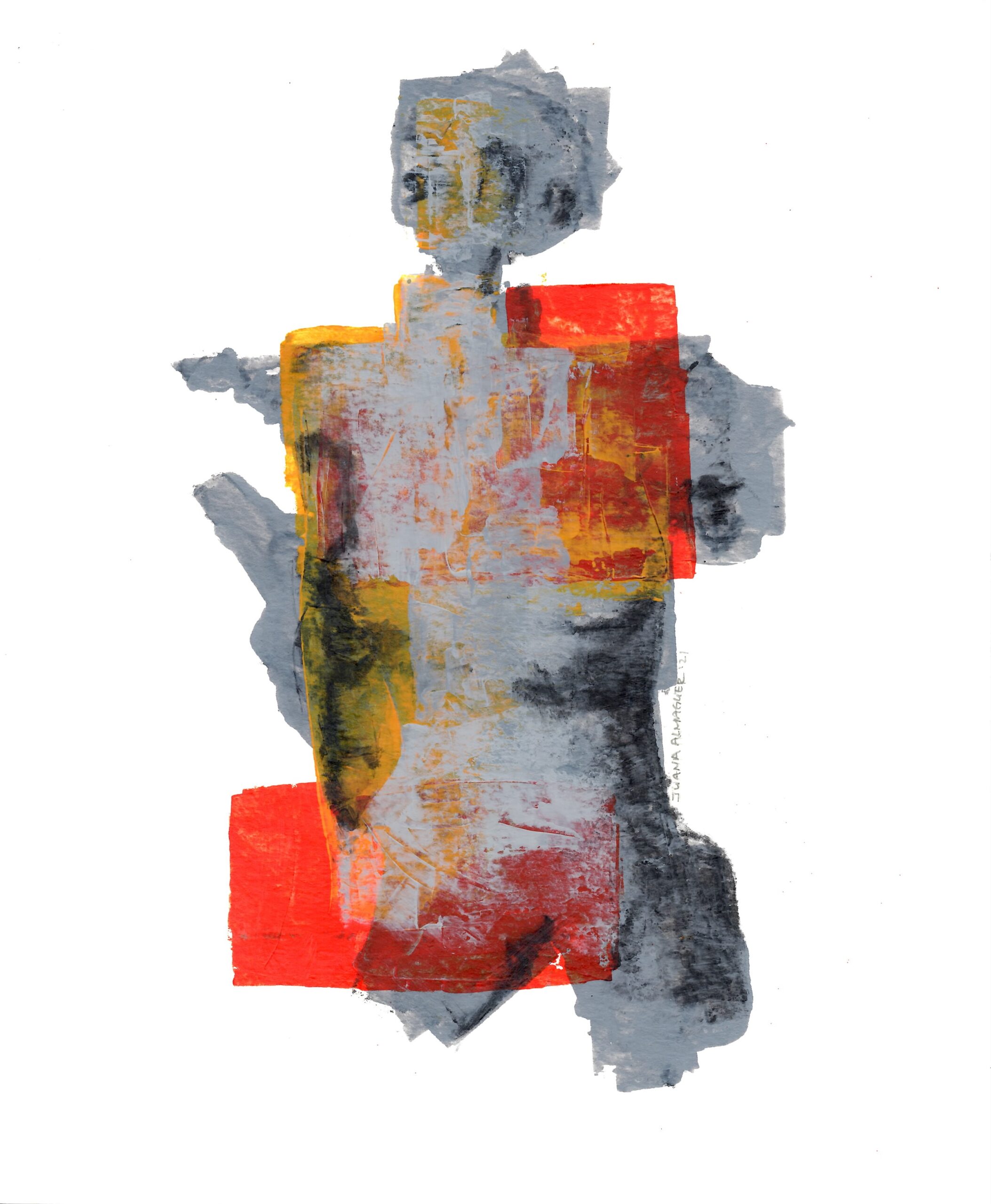
About the Book
Interpreting the Body: Between Meaning and Matter
Edited by Anne Marie Champagne and Asia Friedman
ABSTRACT
Broadening the landscape of body and embodiment theory, the essays curated and juxtaposed in this edited collection draw attention to the processes and problems of understanding bodies within and across different social contexts and interpretive frameworks. The range of analytic perspectives employed by the book’s contributors offers a unique opportunity to investigate the conjunctions and disjunctions between different interpretive traditions’ respective approaches to grasping the meaning and matter of bodies and social life. The theoretical paradigms advanced within the volume challenge the limits of what we know about bodies and interpretation and highlight the promise of interpretation as a focal metaphor for analyzing bodies and embodiment. Interpretation as a concept advances the study of the body as a simultaneously material and semiotic entity. It directs us to consider how and why some aspects or details of the body and embodiment emerge as more notable or important than others, thus revealing how patterns of social, moral, and political salience generate the attentional topography of the body’s materiality. This explicit attention to interpretation as process is part of what distinguishes interpretation from prior concepts of the social construction of the body, which, when centered in systems of language, tend to overlook the structural or material processes and mechanisms through which the social construction of the body takes place.
Keywords: attention, body, embodiment, frameworks, interpretation, materiality, meaning, social construction, theory
Cover Artwork by Juana Almageur
Table of Contents
| Row Headers | Content |
|---|---|
| Authors | by Anne Marie Champagne and Asia Friedman |
| Abstract | ABSTRACT In this introduction to Interpreting the Body: Between Meaning and Matter, co-editors Anne Marie Champagne and Asia Friedman establish the volume’s focal metaphor of interpretation, summarizing its unique benefits and challenges for how social scientists understand and study body and embodiment. Highlighting the social, material, and disciplinary conditions that structure modes of attending, feeling, and thinking about the body in both lay experience and social-scientific analysis, the chapter brings renewed theoretical and methodological light to processes of interpretation in the social construction of the body across different theoretical traditions. Noting how the use of interpretation as a metaphor for analyzing body and embodiment can illuminate the interdependency between meaning and matter, the chapter likewise directs one to consider how and why some aspects or details of the body and embodiment emerge as more notable or important than others, thus revealing how patterns of social, moral, and political salience generate the attentional topography of the body’s symbolic and material dimensions. |
| Tags / Keywords | keywords: attention, body and embodiment, interpretation, materiality, meaning, metaphor, moral salience, social construction of the body, social patterns, theory |
| Chapter Page Link | For updates from the author and access to supplemental materials (interviews, podcasts, syllabi, etc.) when they are made available, please visit the Introduction Chapter. |
| Row Headers | Content |
|---|---|
| Author | by Anne Marie Champagne |
| Abstract | ABSTRACT Tracing the thematization of culture and the body across modern, postmodern, and neo-modern sociological thought, this chapter explores the possibility of developing a meaning-centered, strong cultural sociology of the body and embodiment, one that approaches body and embodiment as constituting a uniquely hermeneutic situation—a fusion of subject and object, ideality and materiality—structured by cultural codes and dependent upon interpretation for getting itself out into the social world. The development of a Strong Program cultural sociological perspective on the body is, author Anne Marie Champagne argues, uniquely suited to ferreting out and reconstructing the personal and collective representations, senses and sensibilities, and myths and motifs through which the physical body comes to embody self, society, and world. |
| Tags / Keywords | keywords: body and embodiment, collective representations, cultural codes, hermeneutics, materiality, meaning, myth and motif, postmodernism, self and society, Strong Program cultural sociology |
| Chapter Page Link | For updates from the author and access to supplemental materials (interviews, podcasts, syllabi, etc.) when they are made available, please visit Chapter 1. |
| Row Headers | Content |
|---|---|
| Author | by Ben Spatz |
| Abstract | ABSTRACT This essay contests the assumed primacy of technoscientific and biochemical methods in determining what human and other bodies are made of. From a perspective grounded in critical race, cultural, and performance studies, as well as embodied artistic research, it offers an expanded molecular theory of identity that foregrounds the radical asymmetry of what are still too often glossed as sociocultural signs or attributes rather than material substances. The essay begins by surveying a handful of recent critical treatments of technoscientific molecules that foreground their racial and gendered construction. It then considers the politics implied by a more expansive conception of the molecular, comparing and contrasting this with theories of the molecular that follow Deleuze and Guattari. The final section reflects on the implications of such a conceptual shift for experimental research methods, including not only a richer way to theorize embodied difference, but also a radical reshuffling of the dominant disciplinary hierarchies that attach greater epistemic primacy to more quantitative methods. |
| Tags / Keywords | keywords: artistic research, critical race studies, cultural studies, Deleuze and Guattari, disciplinary hierarchies, embodied difference, experimental research methods, performance studies, radical asymmetry, theory of identity |
| Chapter Page Link | For updates from the author and access to supplemental materials (interviews, podcasts, syllabi, etc.) when they are made available, please visit Chapter 2. |
| Row Headers | Content |
|---|---|
| Authors | by Kathryn Linn Geurts and Sefakor Komabu-Pomeyie |
| Abstract | ABSTRACT An African language term seselelãme (meaning bodily ways of knowing) has recently spread into a globally popular phenomenon appearing in films, workshops, blogs, therapy sessions, and other venues spotlighted on the world wide web. This chapter explores questions such as: What sorts of interpretations are being made about seselelãme by people attempting to deploy it in Global North contexts? What are the implications of individualizing and commoditizing seselelãme in fee-driven self-transformation workshops? In what ways does this perpetuate symbolic and structural asymmetries underpinning institutional power? This chapter problematizes some of the ways in which seselelãme is being used in Global North contexts (including as a quick fix to the mind–body problem) and then revisits how Ghanaian people themselves narrate bodily ways of knowing. Taking a psycho-socio-cultural approach, the authors align seselelãme with a modal (compared to categorical) way of understanding and being in the world. Finally, the chapter argues that seselelãme is one of Africa’s treasures, which is nonetheless being culturally distorted, culturally appropriated, and culturally stripped of its richness. |
| Tags / Keywords | keywords: Anlo-Ewe, bodily knowing, categorical thinking, cultural appropriation, globalization, mind–body problem, modal thinking, seselelãme |
| Chapter Page Link | For updates from the author and access to supplemental materials (interviews, podcasts, syllabi, etc.) when they are made available, please visit Chapter 3. |
| Row Headers | Content |
|---|---|
| Authors | by Sweta Rajan-Rankin and Mrinalini Greedharry |
| Abstract | ABSTRACT This chapter explores the ways in which racialized bodies are re-presented through a phenomenological analysis of Tsitsi Dangaremgba’s Nervous Conditions. In order to situate the body within gendered and racialized narratives, the authors consider three key assertions. First, that gender is itself a colonial construct and postcolonial accounts of Blackness have often been elided in feminist narratives. Second, by drawing on Mbembe’s concept of “necropolitics” and Fanon’s thesis on the impossibility of Black becoming, the “body” itself becomes a key site for analyzing racialized bodies, highlighting the uneasy hierarchies of race and gender in this regard. And third, that in order to move beyond exceptionalist framings of Blackness–whiteness as binaries, keen attention must be paid to the literary offerings of women of color. Nervous Conditions provides a powerful foil to explore these assumptions through the narratives of two young African girls and their ambivalent relationship with Blackness and modernity. The body serves as the final frontier on which the necropolitics of the post-colony are played out in struggle. The intermingling of race, gender, memory, and presence bring together a fresh gaze by which the phenomenological understanding of the racialized body can be uncovered. |
| Tags / Keywords | keywords: African girls, feminist narratives, gender, necropolitics, Nervous Conditions, phenomenological analysis, postcolonial, race, racialized body, Tsitsi Dangarembga |
| Chapter Page Link | For updates from the author and access to supplemental materials (interviews, podcasts, syllabi, etc.) when they are made available, please visit Chapter 4. |
| Row Headers | Content |
|---|---|
| Author | by Lee F. Monaghan |
| Abstract | ABSTRACT Medicalized concerns about an “obesity epidemic” and the need to treat the body as a modifiable “project” are well rehearsed. Such preoccupations have also been amplified recently, following the outbreak of COVID-19 and calls for responsible risk management and pandemic preparedness. Yet, there is fallout from the ongoing war on obesity. Whilst women and girls are disproportionately impacted (e.g., in terms of stigma and body dissatisfaction), men’s and boys’ bodies and health (behaviors) have also been rendered “problematic.” This chapter draws from critical weight/fat studies and other literature (e.g., medical sociology, critical studies on men) when reinterpreting male bodies and health in crisis times. Rather than endorsing an individualizing, pathologizing, depoliticizing “problem frame” wherein the majority of male bodies are deemed to be deficient (lazy, greedy, ill, risky, irresponsible), this chapter underscores the significance of social structures and processes—the fundamental causes of health inequalities, which exceed fleshy bodies whilst also impacting upon them. |
| Tags / Keywords | keywords: body project, fat, health, inequalities, male bodies, obesity, weight |
| Chapter Page Link | For updates from the author and access to supplemental materials (interviews, podcasts, syllabi, etc.) when they are made available, please visit Chapter 5. |
| Row Headers | Content |
|---|---|
| Author | by Piper Sledge |
| Abstract | ABSTRACT Currently, a wide array of government and non-profit programs provide resources and support to cisgender women as they recover from breast cancer with an implicit focus on restoring the appearance of conventional femininity after treatment. Cisgender women who “live flat” (that is, choose not to have breast reconstruction) often experience deep aesthetic concerns after mastectomy yet typically have no place in these programs. This chapter explores their discussions of vanity, aesthetics, and appearance in relation to their perceptions of themselves, their interactions with others, and the meaning of breasts and attention to appearance in contemporary social life. |
| Tags / Keywords | keywords: aesthetics, breast cancer, breast reconstruction, femininity, gender |
| Chapter Page Link | For updates from the author and access to supplemental materials (interviews, podcasts, syllabi, etc.) when they are made available, please visit Chapter 6. |
| Row Headers | Content |
|---|---|
| Author | by Erin F. Johnston |
| Abstract | ABSTRACT Based on one year of ethnographic fieldwork, interviews, and enactive immersion, this chapter argues that “becoming” an Integral Yoga practitioner is intimately bound up with a cognitive and perceptual reframing of the body—one marked by the cultivation of a sense of separation or “bodily detachment.” In the findings, the author highlights several key areas in which bodily detachment is cultivated. In doing so, this chapter attends closely to both the somatic/practical and the symbolic/discursive realms, tracing the dynamic interplay between them. It highlights the importance, in particular, of looking at talk and discourse in situ in order to better understand how religious practices and discourses become personally meaningful. |
| Tags / Keywords | keywords: discourse, embodiment, enactive ethnography, Integral Yoga, practice, religion, spiritual formation, yoga |
| Chapter Page Link | For updates from the author and access to supplemental materials (interviews, podcasts, syllabi, etc.) when they are made available, please visit Chapter 7. |
| Row Headers | Content |
|---|---|
| Author | by Brittney Miles |
| Abstract | ABSTRACT Through critical examination of mis/interpretations of Black girls’ bodies in school settings, this chapter interrogates readings and performances of Black talk, Black sass, and Black volume. A symbolic interactionist approach to interpreting meanings of Black girls’ bodies allows us to contextualize the subsequent corporeal and material negotiations they make as they navigate misogynoir and controlling images. There are perpetual inconsistencies between meanings about Black girls’ bodies that are ascribed to them and those that are self-defined by them. While Black girls are socialized into meanings about their bodies defined by others (these include negative stereotypes such as the “sapphire” that attempt to define and control what it means to be a “loud” as opposed to “quiet” Black girl), they use embodied reverse discourse and other body projects to craft alternative meanings that complicate such tropes. Ontologies of Black-girl being call us to consider how—through body projects, dress code responses, and sonic performances—Black girls pursue presence and autonomy. Their efforts challenge us to more deeply and comprehensively make space for them in educational spaces where they are on the margins. |
| Tags / Keywords | keywords: Black girls’ bodies, Black ontologies, Black talk, controlling images, dress code, education, misogynoir, reverse discourse, sonic performances, symbolic interaction |
| Chapter Page Link | For updates from the author and access to supplemental materials (interviews, podcasts, syllabi, etc.) when they are made available, please visit Chapter 8. |
| Row Headers | Content |
|---|---|
| Author | by Chandra Russo |
| Abstract | ABSTRACT Though embodied resistance has figured centrally throughout history, social movement scholars have paid scant attention to the role of the body in activism. The few yet important studies on embodied activism tend to highlight the work of intentional bodily performance with less attention paid to how bodily experience shapes activists and the movements they join. Yet scholars have long argued that social movements should be understood as knowledge projects, bearing and disseminating alternative and often resistant worldviews. Through ethnographic study with solidarity activists that resist the US security state, author Chandra Russo finds that embodied experience is central to cultivating new and resistant forms of knowledge. This chapter seeks to center embodied experience as a key interpretive lens for both social movement participants and scholars, considering the layered ways in which studying the embodiment of solidarity activism is itself an embodied, interpretive project. |
| Tags / Keywords | keywords: activism, embodiment, ethnography, social movements, solidarity, US security state |
| Chapter Page Link | For updates from the author and access to supplemental materials (interviews, podcasts, syllabi, etc.) when they are made available, please visit Chapter 9. |
| Row Headers | Content |
|---|---|
| Author | by Annemarie Jutel |
| Abstract | ABSTRACT In this retrospective reflection, sociologist of diagnosis Annemarie Jutel reflects on the progression of her academic thought vis-à-vis Drew Leder’s theories about bodily disappearance, highlighting the embodied nature of academic scholarship. In the same way that the body of the transcendent subject is not perceived, for it disappears in favor of subjective intentions, so too, argues Jutel, should our scholarly points of departure—which frequently include the very intimate personal experiences of the scholar—vanish in favor of broader, theoretical concepts. |
| Tags / Keywords | keywords: bodily disappearance, classification, embodied experience, embodying scholarship, sociology of diagnosis |
| Chapter Page Link | For updates from the author and access to supplemental materials (interviews, podcasts, syllabi, etc.) when they are made available, please visit Chapter 10. |
Highlights

Ben Spatz
Author

Kathryn Linn Geurts
Author
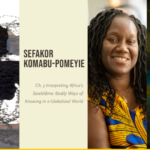
Sefakor Komabu-Pomeyie
Author
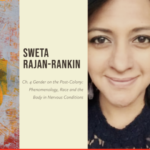
Sweta Rajan-Rankin
Author
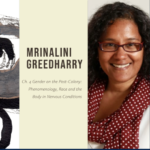
Mrinalini Greedharry
Author
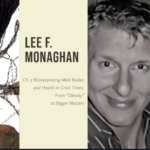
Lee F. Monaghan
Author

Piper Sledge
Author

Erin F. Johnston
Author
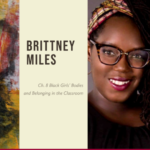
Brittney Miles
Author

Chandra Russo
Author

Annemarie Jutel
Author
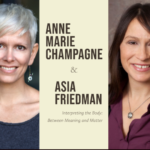
Meet the Editors
Anne Marie Champagne and Asia Friedman
Reviews
“This fascinating collection explores how power relations inscribe themselves upon the body, and definitions of what is ‘healthy’ and ‘sick,' ‘right’ and ‘wrong.' The authors highlight the body as an interpretive site of resistance whereby self and community reclaim positive empowerment. It's simply a must-read.”
— Drew Leder, Loyola University
“This book will leave you with a new approach to the mind/body divide. With a meaningful set of contributions from a wide range of leading scholars it fills an important gap in how we understand body and embodiment. A much-needed and impressive accomplishment.”
— Georgiann Davis, University of New Mexico
“This excellent collection of interpretive, theoretically rich studies of embodiment shows how productive the dissensus amongst perspectives is when it comes to sensing the body’s openness to the vicissitudes of modernity.”
— Arun Saldanha, University of Minnesota
“A diverse yet surprisingly focused collection of strong and innovative contributions to the field. A must-read for those interested in the (social) meanings and (contested) interpretations of bodies.”
— Werner Binder, Masaryk University
Available for Order Now
Interpreting the Body: Between Meaning and Matter is available for purchase in hardcover, paperback, and E-book formats from most major online retailers and booksellers (Amazon, Target, Walmart, Barnes & Noble, Hudson Booksellers, Books-a-Million, and others). It is also available in digital format through academic publishers such as Oxford Academic and Cambridge Core. Search online or click the purchase button below to order your copy today direct from the publisher, Bristol University Press.
TIP: Sign up for BUP's newsletter and enjoy a 25% discount!